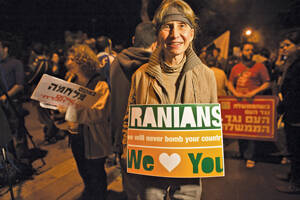While Iran’s secret nuclear program has raised serious questions about that country’s intentions, a military attack on Iranian nuclear facilities would not, in view of the U.S. bishops and other Catholic leaders, be justified under Catholic teaching. “The problem with preventive war is that it lowers the barrier to war too low,” said Stephen Colecchi, director of the bishops’ Office of International Justice and Peace. “Using military action for a vague and gathering threat is very different than using military force in the face of an immediate threat,” he said.
That path “blurs that fundamental distinction between legitimate defense and aggression,” said Gerard Powers, director of policy studies at Joan B. Kroc Institute for International Peace Studies at the University of Notre Dame. “It would make a turbulent and unstable Middle East even more so.
“It would be inconsistent with moral certainty that is required before you use military force, because it is often speculative about what might happen in the future. In the end it is an endorsement of a notion that might makes right,” Powers said.
Various reports have surfaced indicating that Israel is nearing a decision on a military strike in an effort to knock out some of Iran’s key research and military facilities. President Obama reportedly has worked to deter any such strike, arguing that economic sanctions will force Iran to scale back its nuclear program, become more transparent about its intentions and allow wider access to International Atomic Energy Agency inspectors.
Kenneth Himes, O.F.M., associate professor of theological ethics at Boston College, agreed with the U.S. bishops that any attack on Iran under current circumstances constitutes a lowering of the threshold for war. “Given the state of the devastation of war, we should be raising the bar for going to war,” he said. Father Himes also worries that Iran might respond through its regional proxies—Hamas in the Gaza Strip and Hezbollah in Lebanon—in mounting attacks on civilian targets.
Father Himes said he would welcome direct negotiations between U.S. and Iranian delegations. Doing so would give Iran a level of respect it seeks in the international community, he said.
Despite the secrecy surrounding Iran’s nuclear program, Marie Dennis, co-president of Pax Christi International, said she is concerned that any attack will hasten the expansion of an arms race in the region. She called for the United States to lead the effort to make the Middle East a nuclear weapons-free zone.
Pax Christi feels very strongly, she said, that the threat to the state of Israel will be exacerbated by preventive war on Iran. “The best way to provide for security for Israel—which it has a right to expect, like Iran—is by eliminating the possession of nuclear weapons,” she said, “so that we ratchet down this kind of threat and that we work for greater regional and global understanding.”
The Catholic Church in the United States and in other states that possess nuclear weapons states can “take the lead and be really serious about the consequences of continuing reliance on nuclear weapons,” Dennis said. “We’ve never moved as a church to a place where we as a pastoral imperative challenged the engagement of Catholic people in nuclear weapons production and the strategies of using nuclear weapons.”








